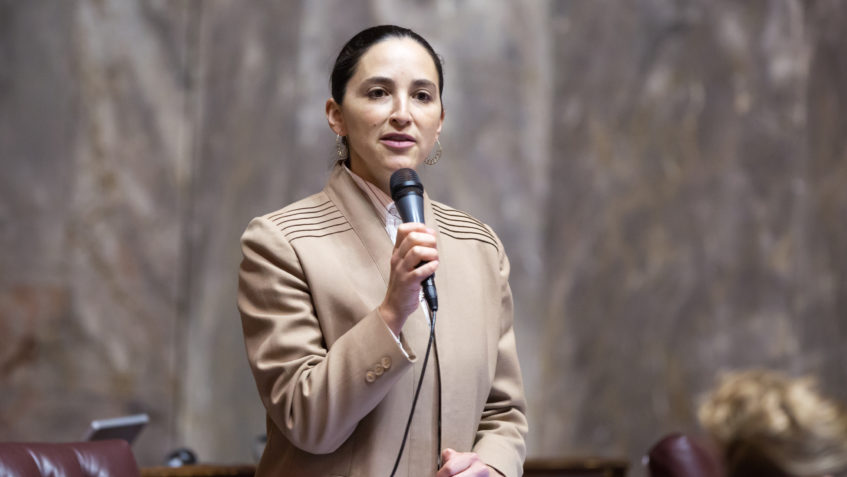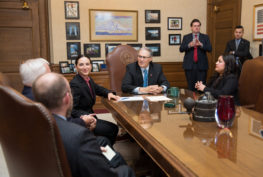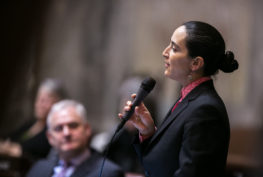Columbia Basin Herald/ Jan. 17, 2018
By Emry Dinman
Gov. Jay Inslee talks about the importance of new gun control regulations, flanked by Democratic lawmakers, gun control advocates and survivors of gun violence.
OLYMPIA — About 1,000 gun rights and gun control advocates met at the capital this week to testify on five bills that would affect the right of Washingtonians to keep firearms.
One bill, SB 6049, would make possession of a large capacity magazine, or a magazine capable of holding more than 10 rounds, a gross misdemeanor. The proposal would continue allowing large capacity magazines already owned when the law would take effect.
Another bill, SB 5444, would require anyone purchasing an assault weapon to have a license for that weapon. Applications for a license would require the applicant’s personal information, including full sets of fingerprints, and a list of every assault weapon or large capacity magazine owned. The applicant would have to pass both state and federal background checks.
Assault weapons include semiautomatic rifles and pistols that can accept a detachable magazine and have certain features, or rifles and pistols with fixed magazines capable of holding over 10 rounds. Also included are short-barrel rifles, semiautomatic shotguns with certain features and shotguns with revolving cylinders.
Assault weapons already owned by the law’s effective date would not require a license until July 1, 2020.
Those who testified against SB 5444 and SB 6049 said that they would not make Washingtonians safer. Keely Hopkins, Washington state liaison for the NRA, said that there was virtually no safety distinction between a 10-round and an 11-round magazine. Hopkins also pointed to a federal ban on large capacity magazines from 1994 to 2004, which she said had no effect on crime rates.
Jane Milhans, a firearms instructor who volunteers to train women through the Tacoma Rifle and Revolver Club, said that women would be negatively impacted by a ban on assault weapons. Milhans said that women gun owners often prefer AR-15s, which would be considered an assault weapon, due to their adjustable stocks and low recoil.
“It is a woman’s right to own firearms,” Milhans said. “It gives her a fighting chance.”
Attorney General Bob Ferguson, who requested both bills, said that assault weapons are more likely to be used in mass shootings and would result in more deaths.
Ferguson pointed to the 2016 Mukilteo shooting, in which 19-year-old Allen Ivanov entered a house party in Mukilteo and emptied a magazine into the crowd, killing three. About a week earlier, Ivanov had walked into a Cabela’s and walked out with an AR-15 the same day, which Ferguson called, “unacceptable.”
A third bill, SB 5992 would criminalize possession of any trigger modification devices, including bumpstocks, in the wake of the Las Vegas mass shooting last October. Anyone possessing such a device after July 1, 2019, would be guilty of a Class C felony.
Ann-Marie Parson lost her daughter in the Las Vegas mass shooting last October, and testified in favor of SB 5444, 6049 and 5992. The combination of weapon type, large capacity magazines and bumpstocks all contributed to the deadly scene in Las Vegas, Parson said.
“If the gunman was in this room, none of us could run in time,” Parson said.
Parson was just one of several people who testified on behalf of loved ones who had been present at the Las Vegas mass shooting, or who had been there themselves.
Under a fourth bill, SB 5463, any firearm not in the immediate possession of its owner must be kept in a locked storage space or be secured with a lock that prevents the firearm from discharging.
Nyla Fritz testified on behalf of her brother, Arnold Fritz, who was 14 when he was killed during the 1996 school shooting at Frontier Junior High in Moses Lake. The gunman was a fellow student, 14-year-old Barry Loukaitis, who came to the school armed with a rifle and two handguns taken from Loukaitis’ father.
“Barry should not have been able to get a gun,” Fritz said.
Those who testified against SB 5463 argued that forcing law-abiding gun owners to keep their weapons in storage would prevent them from acting quickly in defense of themselves or others.
Anne Hamilton was once the victim of armed robbery, where she was blindfolded and robbed in her own home. She said that she feared she would not be able to get into a safe quickly enough to defend herself in the future.
Under SB 6146, local jurisdictions would be given the authority to write their own gun control legislation. State preemption currently prevents local jurisdictions from placing more restrictions on gun owners than allowed for under state law.
Sen. Rebecca Saldana, who sponsored SB 6146, said she was inspired to write the legislation after finding five shell casings next to a swingset in a local park.
Opponents of the bill are concerned that it would create patchwork regulations, in which a gun owner could unknowingly bring a firearm from a jurisdiction where it was legal into one where it was not.
Unless otherwise noted, the effective date for these laws would be 90 days after the 2018 legislative session ends.




